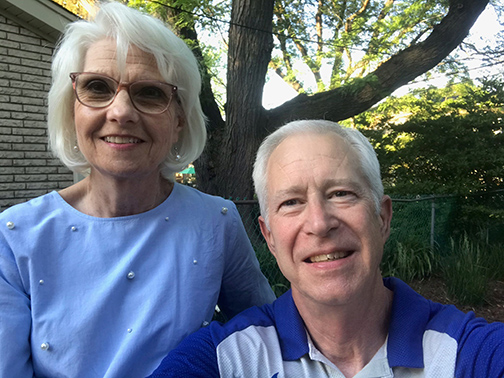Timing is everything
June 15, 2021
Every second matters when responding to a stroke

It was early in December 2020 when Arlington Heights resident Gary Deitelhoff, 68, decided to take his dog on a walk to NCH to do some holiday shopping at the gift shop. Gary is familiar with NCH as his community hospital and as a place he called on during his career in the sales of high-filtration, high-quality blood filters.
That day when Gary started back on the short trip home he started to feel strange and a little dizzy. “I decided to sit down until I felt well enough to walk home,” he recalled. “A young man stopped to see if I was okay and offer assistance.” Although Gary thought he was fine and tried to decline the kind offer, he realized when he stood up that he had completely lost the use of his right hand and right leg. It appeared Gary was experiencing a stroke.
His good Samaritan, named Andy, sprang into action and dialed 911. Since they were so close to the hospital Gary recalls the ambulance arriving in what seemed like an instant. The paramedics rushed him to the NCH Emergency Department where he was quickly treated with tPA, a strong “clot dissolving” medicine. According to the American Heart Association, the benefits of tPA in patients with acute ischemic stroke are time-dependent, and guidelines recommend a door-to-needle time of 60 minutes or less.
Gary was in the right place at the right time.
In an already ongoing partnership with NorthShore University HealthSystem, NorthShore stroke neurologists provide NCH with physician services to oversee stroke diagnosis, specifically “tele-stroke,” or telemedicine specialized for stroke care, as well as NorthShore neurosurgeons to provide endovascular and surgical interventions. In Gary’s case, Shakeel Chowdhry, M.D., was working at NorthShore and was quickly able to assess his condition using Viz.ai, artificial intelligence software used to analyze brain scans and identify strokes in minutes — as opposed to hours — significantly increasing the patient’s chances of a good outcome.
This technology allowed Dr. Chowdhry to provide expedited treatment for Gary before he arrived to join the NCH care team. After treatment, when he woke up he had fully regained use of his right hand and right leg. “Today I do not suffer from any after-effects of my stroke, except for slight speech impairment that has been corrected with therapy.”
Gary spent only two days in the hospital before being released to go home to his wife and two daughters. “I know Christmas 2020 was different for many people this year, but it took on a whole new meaning for me.”
He is grateful for all those who helped him – the doctors, nurses, paramedics and especially his good Samaritan, Andy. “I can’t tell you how good I feel — better each and every day but, I can’t help but thank God for Andy and the fact that he did not hesitate and came right over when he saw I was struggling. He just took charge and I can’t tell you how grateful I am for him.”
According to the American Heart Association:
Stroke Symptoms
Spot a stroke F.A.S.T.
- FACE DROOPING – Does one side of the face droop or is it numb? Ask the person to smile.
- ARM WEAKNESS – Is one arm weak or numb? Ask the person to raise both arms. Does one arm drift downward?
- SPEECH DIFFICULTY – Is speech slurred, are they unable to speak, or are they hard to understand? Ask the person to repeat a simple sentence, like “the sky is blue.” Is the sentence repeated correctly?
- TIME TO CALL 9-1-1 – If the person shows any of these symptoms, even if the symptoms go away, call 9-1-1 and get them to the hospital immediately.
Learn more about the Comprehensive Stroke Center at NCH here.
*Dr. Chowdhry is an independent physician in the community with privileges at NCH. He is not an employee or agent of NCH.